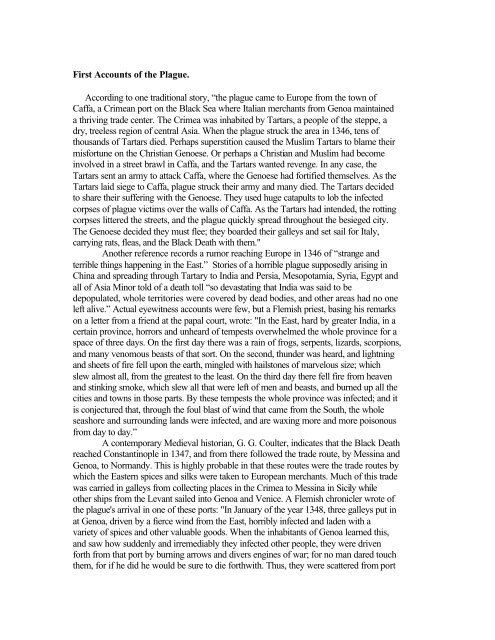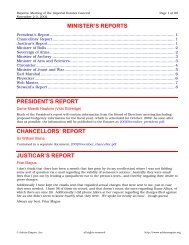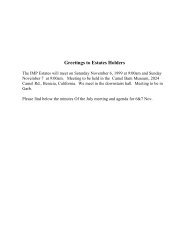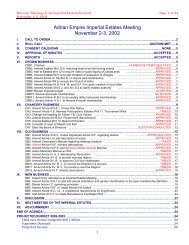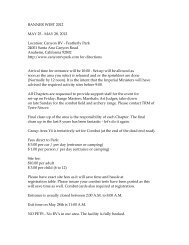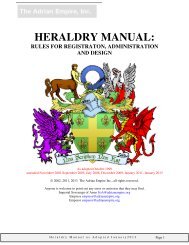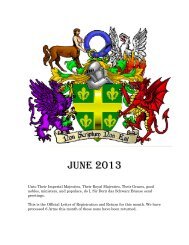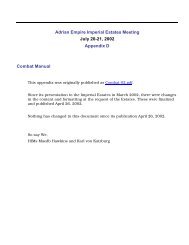Research Paper on the Black Death - Back to Main Page
Research Paper on the Black Death - Back to Main Page
Research Paper on the Black Death - Back to Main Page
Create successful ePaper yourself
Turn your PDF publications into a flip-book with our unique Google optimized e-Paper software.
First Accounts of <strong>the</strong> Plague.<br />
According <strong>to</strong> <strong>on</strong>e traditi<strong>on</strong>al s<strong>to</strong>ry, “<strong>the</strong> plague came <strong>to</strong> Europe from <strong>the</strong> <strong>to</strong>wn of<br />
Caffa, a Crimean port <strong>on</strong> <strong>the</strong> <strong>Black</strong> Sea where Italian merchants from Genoa maintained<br />
a thriving trade center. The Crimea was inhabited by Tartars, a people of <strong>the</strong> steppe, a<br />
dry, treeless regi<strong>on</strong> of central Asia. When <strong>the</strong> plague struck <strong>the</strong> area in 1346, tens of<br />
thousands of Tartars died. Perhaps superstiti<strong>on</strong> caused <strong>the</strong> Muslim Tartars <strong>to</strong> blame <strong>the</strong>ir<br />
misfortune <strong>on</strong> <strong>the</strong> Christian Genoese. Or perhaps a Christian and Muslim had become<br />
involved in a street brawl in Caffa, and <strong>the</strong> Tartars wanted revenge. In any case, <strong>the</strong><br />
Tartars sent an army <strong>to</strong> attack Caffa, where <strong>the</strong> Genoese had fortified <strong>the</strong>mselves. As <strong>the</strong><br />
Tartars laid siege <strong>to</strong> Caffa, plague struck <strong>the</strong>ir army and many died. The Tartars decided<br />
<strong>to</strong> share <strong>the</strong>ir suffering with <strong>the</strong> Genoese. They used huge catapults <strong>to</strong> lob <strong>the</strong> infected<br />
corpses of plague victims over <strong>the</strong> walls of Caffa. As <strong>the</strong> Tartars had intended, <strong>the</strong> rotting<br />
corpses littered <strong>the</strong> streets, and <strong>the</strong> plague quickly spread throughout <strong>the</strong> besieged city.<br />
The Genoese decided <strong>the</strong>y must flee; <strong>the</strong>y boarded <strong>the</strong>ir galleys and set sail for Italy,<br />
carrying rats, fleas, and <strong>the</strong> <strong>Black</strong> <strong>Death</strong> with <strong>the</strong>m."<br />
Ano<strong>the</strong>r reference records a rumor reaching Europe in 1346 of “strange and<br />
terrible things happening in <strong>the</strong> East.” S<strong>to</strong>ries of a horrible plague supposedly arising in<br />
China and spreading through Tartary <strong>to</strong> India and Persia, Mesopotamia, Syria, Egypt and<br />
all of Asia Minor <strong>to</strong>ld of a death <strong>to</strong>ll “so devastating that India was said <strong>to</strong> be<br />
depopulated, whole terri<strong>to</strong>ries were covered by dead bodies, and o<strong>the</strong>r areas had no <strong>on</strong>e<br />
left alive.” Actual eyewitness accounts were few, but a Flemish priest, basing his remarks<br />
<strong>on</strong> a letter from a friend at <strong>the</strong> papal court, wrote: "In <strong>the</strong> East, hard by greater India, in a<br />
certain province, horrors and unheard of tempests overwhelmed <strong>the</strong> whole province for a<br />
space of three days. On <strong>the</strong> first day <strong>the</strong>re was a rain of frogs, serpents, lizards, scorpi<strong>on</strong>s,<br />
and many venomous beasts of that sort. On <strong>the</strong> sec<strong>on</strong>d, thunder was heard, and lightning<br />
and sheets of fire fell up<strong>on</strong> <strong>the</strong> earth, mingled with hailst<strong>on</strong>es of marvelous size; which<br />
slew almost all, from <strong>the</strong> greatest <strong>to</strong> <strong>the</strong> least. On <strong>the</strong> third day <strong>the</strong>re fell fire from heaven<br />
and stinking smoke, which slew all that were left of men and beasts, and burned up all <strong>the</strong><br />
cities and <strong>to</strong>wns in those parts. By <strong>the</strong>se tempests <strong>the</strong> whole province was infected; and it<br />
is c<strong>on</strong>jectured that, through <strong>the</strong> foul blast of wind that came from <strong>the</strong> South, <strong>the</strong> whole<br />
seashore and surrounding lands were infected, and are waxing more and more pois<strong>on</strong>ous<br />
from day <strong>to</strong> day.”<br />
A c<strong>on</strong>temporary Medieval his<strong>to</strong>rian, G. G. Coulter, indicates that <strong>the</strong> <strong>Black</strong> <strong>Death</strong><br />
reached C<strong>on</strong>stantinople in 1347, and from <strong>the</strong>re followed <strong>the</strong> trade route, by Messina and<br />
Genoa, <strong>to</strong> Normandy. This is highly probable in that <strong>the</strong>se routes were <strong>the</strong> trade routes by<br />
which <strong>the</strong> Eastern spices and silks were taken <strong>to</strong> European merchants. Much of this trade<br />
was carried in galleys from collecting places in <strong>the</strong> Crimea <strong>to</strong> Messina in Sicily while<br />
o<strong>the</strong>r ships from <strong>the</strong> Levant sailed in<strong>to</strong> Genoa and Venice. A Flemish chr<strong>on</strong>icler wrote of<br />
<strong>the</strong> plague's arrival in <strong>on</strong>e of <strong>the</strong>se ports: "In January of <strong>the</strong> year 1348, three galleys put in<br />
at Genoa, driven by a fierce wind from <strong>the</strong> East, horribly infected and laden with a<br />
variety of spices and o<strong>the</strong>r valuable goods. When <strong>the</strong> inhabitants of Genoa learned this,<br />
and saw how suddenly and irremediably <strong>the</strong>y infected o<strong>the</strong>r people, <strong>the</strong>y were driven<br />
forth from that port by burning arrows and divers engines of war; for no man dared <strong>to</strong>uch<br />
<strong>the</strong>m, for if he did he would be sure <strong>to</strong> die forthwith. Thus, <strong>the</strong>y were scattered from port


